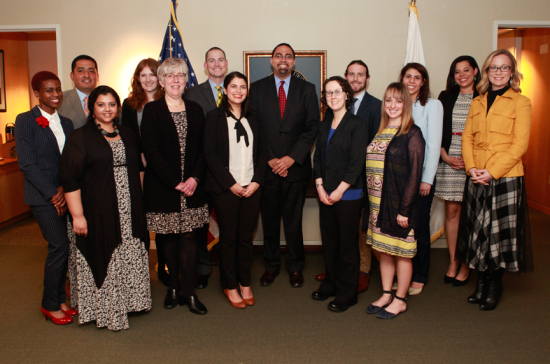

Share
Erica Schatzlein was checking her email over lunch Feb. 23 when she found an invite to have tea with the U.S. secretary of education. The teacher of English language learners at Nokomis Montessori North was skeptical.
“At first I was thinking, ‘Is this real? It looks real,’” she said. “I decided to respond and see what happens.”
A month later she was in Washington, D.C., one of 11 educators participating in a “teatime conversation” with then-interim Secretary John B. King Jr. about how to create safe learning environments where students are free from discrimination based on race, religion and national origin.
Schatzlein, who lives in Minneapolis, has taught in the St. Paul Public Schools since 2004 and is an active member of the St. Paul Federation of Teachers, twice serving on the union’s bargaining team.
But Schatzlein suspects it was her ELL activism that drew notice from the Department of Education. SPFT’s 2013-15 contract established a specific committee to consider ELL policies and advocate for ELL students. Schatzlein is a member, and she’s become passionate about better serving the district’s fast-growing Karen population, which includes many students whose education has been limited or interrupted.
Schatzlein brought that passion for ELL advocacy to Washington.
“I did some reflecting on what the secretary needs to hear about the needs of our kids here in Minnesota and what the federal government can do,” she said. “There are needs for our ELL kids that are heightened based on their life experiences, and I wanted that to be addressed.
“I also wanted to talk about the need for student supports, for school counselors, social workers, mental health care professionals; support for teachers and training to make sure all staff and teachers who work with ELL kids know how to meet their needs.”
It turned out Schatzlein wasn’t the only teacher in the hour-long session hoping to raise those concerns.
“Those issues were brought up almost immediately,” she said. “We could’ve talked for days.”
King mostly listened to the conversation, but when it was over he revealed some of the department’s forthcoming initiatives. “Happily some of them aligned with the issues we had brought up,” Schatzlein said.
Still, she left the teatime conversation feeling “guarded hope,” given the political climate in Washington. But Schatzlein said it was good to know the issues and ideas she’s working on in St. Paul are also percolating in the nation’s capital.
“Right now we’re so concerned about test scores when we talk about student achievement,” she said. “What is often forgotten is if our students don’t have their safety, physical and mental-health needs met, the achievement is not going to be there.”
And if teachers don’t have a strong voice on the job, Schatzlein added, it’s harder to effectively advocate for their students – at the local or national level.”
“If I had not had my union, this meeting would not have happened,” she said. “Their support of ELL issues and support of my own development – learning how to advocate and how to organize – is what made this possible.”

